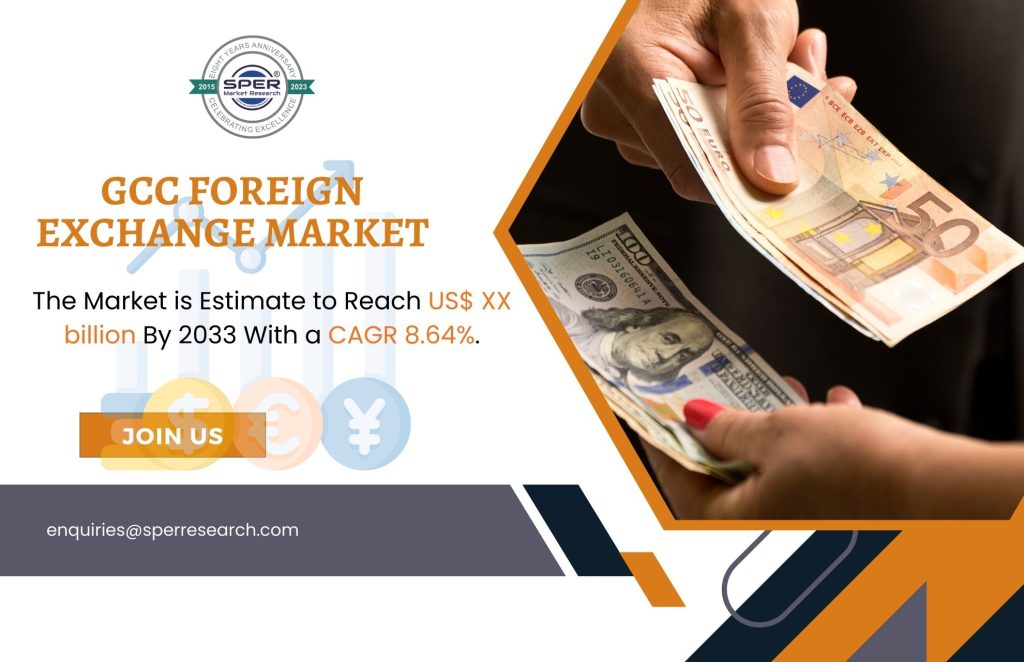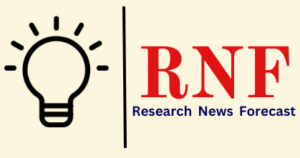GCC Foreign Exchange Market Share 2023, Upcoming Trends, Revenue, Growth Drivers, Business Challenges, Opportunities and Forecast Analysis 2033: SPER Market Research

Unlike stock trading, which occurs on a centralized exchange, forex trading is decentralized. Rather, it takes place in an over-the-counter (OTC) market directly between two parties. The market is open for business five days a week, 24 hours a day, because of the nature of the economy and the various time zones in which its participants are located. Foreign exchange therefore plays a crucial role in the economy by enabling easy financial transactions between nations and economies and by giving investors the chance to profit from fluctuations in currency values.
According to SPER market research, GCC Foreign Exchange Market Size – By Counterparty, By Type – Regional Outlook, Competitive Strategies and Segment Forecast to 2033’ state that the GCC Foreign Exchange Market is predicted to reach USD XX billion by 2033 with CAGR of 8.64%.
The GCC nations are aggressively broadening their economic bases outside the oil and gas industry. Increased trade and investment opportunities are brought about by economic diversification initiatives, which affect currency exchange rates. Being significant producers of oil, the GCC’s currencies are vulnerable to changes in the price of oil. Variations in oil prices can affect trade balances, government revenues, and currency values. Monetary policy is shaped in large part by the GCC’s central banks, which include the Central Bank of the UAE and the Saudi Arabian Monetary Authority (SAMA). The dynamics of the forex market are impacted by decisions made on interest rates and currency pegs. One important component influencing currency values is political stability. GCC nations with stable political systems are more likely to draw in international capital and keep their currencies strong.
The industry seems to facing several challenges. A number of GCC nations have their currencies pegged to the US dollar or under fixed exchange rate regimes. Although this offers stability, it can also restrict the flexibility of monetary policy and provide difficulties when the economy is stressed. Long-term trade imbalances can have an impact on the foreign exchange market, especially if a nation depends significantly on imports. A nation’s currency may be under pressure from significant trade imbalances. Changes in capital flows can have an effect on exchange rates by influencing the supply and demand for currencies, including foreign direct investment and portfolio investments. Variations in inflation rates between GCC nations and principal trading partners can have an effect on actual exchange rates, competitiveness, and the foreign currency market.
Request For Free Sample Report @ https://www.sperresearch.com/report-store/gcc-foreign-exchange-market.aspx?sample=1
Impact of COVID-19 on GCC Foreign Exchange Market
Since the currencies of the GCC countries are intimately linked to international trade, distractions in trade and economic activity on a global scale brought about by Covid-19 lockdown and restrictions may have an impact on them. Remittances and tourist declines, two major drivers of several GCC countries’ economy, could have an impact on exchange rates and currency flows. Uncertainties surrounding the epidemic may cause changes in investor mood, which may have an effect on capital flows and the strength of GCC currencies in the foreign exchange market. Due to the varying economic frameworks of the GCC countries, there may have been regional variations in the pandemic’s effects. Economies that are more diverse may have had different effects on currencies than those that rely mostly on oil.
GCC Foreign Exchange Market Key Player
Dubai is fast emerging as the industry’s worldwide centre of regulation. Large forex brokers have set up shop in Dubai in recent years. Furthermore, there have been an increasing number of branches or representative offices of European and UK brokers in the city. Additionally, some of the market key players are Barclays, BNP Paribas, Citibank, Deutsche Bank, Goldman Sachs, HSBC Holdings plc., JPMorgan Chase & Co., The Royal Bank of Scotland, UBS AG, Standard Chartered PLC, State Street Corporation, and XTX Markets Limited and various others.
GCC Foreign Exchange Market Segmentation:
The SPER Market Research report seeks to give market dynamics, demand, and supply forecast for the years up to 2033. This report contains statistics on product type segment growth estimates and forecasts.
By Counterparty: Based on the Counterparty, GCC Foreign Exchange Market is segmented as; Reporting Dealers, Other Financial Institutions, Non-financial Customers.
By Type: Based on the Type, GCC Foreign Exchange Market is segmented as; Currency Swap, Outright Forward and FX Swaps, FX Options
By Region: This research also includes data for Oman, Qatar, Saudi Arabia, UAE , Others.
This study also encompasses various drivers and restraining factors of this market for the forecast period. Various growth opportunities are also discussed in the report
For More Information, refer to below link:-
GCC Foreign Exchange Market Growth
Related Reports:
Follow Us –
LinkedIn | Instagram | Facebook | Twitter
Contact Us:
Sara Lopes, Business Consultant – U.S.A.
SPER Market Research
+1-347-460-2899





